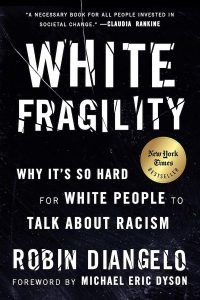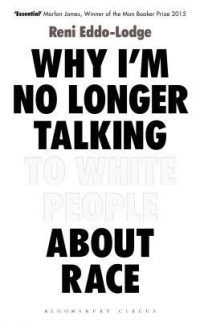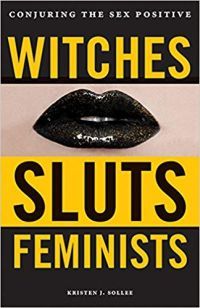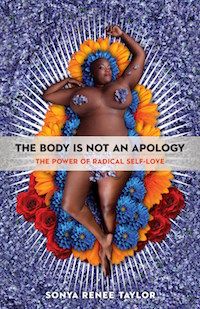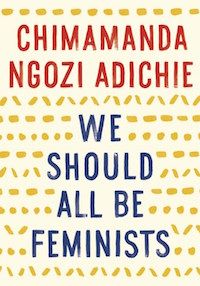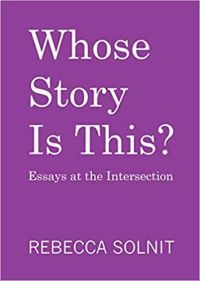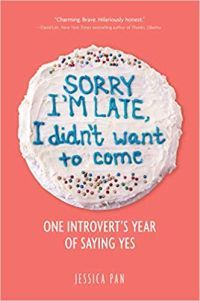
9 Books I Leave Out Around the House So People Know What They’re Getting Into
This content contains affiliate links. When you buy through these links, we may earn an affiliate commission.
The other week, several colleagues and I were commiserating with one another about the dodging and weaving we had to do when extended family got together and casually shared problematic opinions with the assumption that they were surrounded by like-minded people. We all bemoaned how terrible we were at engaging in these tough conversations without losing our shit, especially when those other people seemed to derive a certain sense of glee over winding us up.
I shared how at one point that week I had simply held up my hand and said, "Listen. This conversation between us is not going to go well. How about we just skip it?" It was a polite warning shot, a way to convey that I disagreed with that person but did not want to destroy our relationship over the disagreement.*
In much the same way, I like to casually leave certain books lying around the house. Books that state boldly where my interests lie without my ever having to open my mouth. Books with bold, provocative titles and equally bold, provocative cover designs. Because if those titles happen to provoke further discussion, at least the other party has a hint of where my values lie.
What can you find lying around my house?
At the time of the above-mentioned conversation, White Fragility was on my coffee table. As someone who has not always been the most aware when it comes to my own privilege, this book has been on my TBR for a while. In recent years, I've come to learn more about cultural appropriation, white privilege, and inherent bias, which has led me to make some changes in my life. But these changes have earned me push-back from those who are close to me. Every time I open my mouth in an attempt to explain, however, they get defensive, and I get…sputtery. This book—about why white people struggle to discuss racism and how this resistance only perpetuates various structural inequities—is the key (I hope!) to having more constructive conversations.
While White Fragility is written by a white antiracist educator, this book is by a black journalist who writes regularly about feminism and structural racism. This #ownvoices text is about who is (and is not) leading discussions about race and racism—and why. The cheeky title and cover design make it a perfect just-hanging-out-on-the-kitchen-table conversation starter.
As a writer whose main beat is female sexuality, I have no shortage of books about the sexy-sex lining my shelves. But this new acquisition is more eye-catching than most and, once it causes the initial double-take, is sure to lead to some fascinating conversations about the enduring demonization of women and female sexuality.
One of my passion points these days is the importance of early childhood sexuality education, and as such I have a ton of books on how to approach the topic as a parent, plus a slew of books meant specifically for my child. I love to keep these educational books mixed in with all of my daughter's other books, because it is perfectly normal. Our sexuality is a normal, integral part of our overall health and well-being, and so is the desire to talk about it. It's my wish that when my daughter brings one of these books over to a grandparent and asks them to read it to her, it normalizes the conversation for them, too.
My mother grew up with a weight complex and is passive-aggressive when it comes to my weight and eating habits. My dad filled my childhood with fat jokes. My brother and his wife mock my request to not use body shaming language in front of my daughter. I love my family. They are all perfectly lovely people. But their tone around body issues drives me up a wall. The perfectly declarative title of Tovar's book says it all. The lesson inside—on how our bodies are not something to be fixed—is inspiring.
And in case they don't get it the first time, Taylor's book doubles down, exploring how the act of loving our own bodies allows us to make space for every body, and also enables us to dismantle the systems that continue to perpetuate body shame. I also love how Taylor unapologetically bares her own body, lounging across her book cover, eyes staring directly into the camera as if she's daring you to say something.
Here's another title I appreciate for its explicit nature, though the argument is far more complex than it first appears. In this essay-length book, Adichie presents a definition of feminism that is grounded in inclusivity.
Up until now, the Solnit book I recommended to everyone was Men Explain Things to Me. But this latest—which releases on September 3, 2019—has me highlighting passages all over the damn place. It's sure to open up many conversations around who has the power to make change, who is being left behind in the midst of this change, and why. It's destined to be the book I leave in my favorite reading spot by the living room window, next to the easy chair to which guests tend to gravitate.
While the tone of this book is distinct from the others mentioned in this post, I have to include it, as it's been generating comments from people everywhere I go. As a socially anxious introvert, I don't think I've ever come across a title that so perfectly conveys who I am, and those who catch me reading it can't help but laugh. In this fun read, Pan spends a year "extroverting" in opposition to her natural tendencies. In the process, she learns that while she must continue to honor her introvert self, opening herself up to new experiences and interactions has made her life undeniably richer. If we're talking about books that give people a heads up as to whom they're about to engage with (moi), this one has to be on the list.
Which books are on your list? *I know that silence is complicity, but I also know that—because of my social anxiety—I'm a hot mess when it comes to certain social interactions. I find that I'm far more effective in conveying my values to others in writing, or by sharing the brilliant work of others.
 White Fragility: Why It's So Hard for White People to Talk About Racism by Robin DiAngelo
White Fragility: Why It's So Hard for White People to Talk About Racism by Robin DiAngelo
At the time of the above-mentioned conversation, White Fragility was on my coffee table. As someone who has not always been the most aware when it comes to my own privilege, this book has been on my TBR for a while. In recent years, I've come to learn more about cultural appropriation, white privilege, and inherent bias, which has led me to make some changes in my life. But these changes have earned me push-back from those who are close to me. Every time I open my mouth in an attempt to explain, however, they get defensive, and I get…sputtery. This book—about why white people struggle to discuss racism and how this resistance only perpetuates various structural inequities—is the key (I hope!) to having more constructive conversations.
 Why I’m No Longer Talking to White People About Race by Reni Eddo-Lodge
Why I’m No Longer Talking to White People About Race by Reni Eddo-Lodge
While White Fragility is written by a white antiracist educator, this book is by a black journalist who writes regularly about feminism and structural racism. This #ownvoices text is about who is (and is not) leading discussions about race and racism—and why. The cheeky title and cover design make it a perfect just-hanging-out-on-the-kitchen-table conversation starter.
 Witches, Sluts, Feminists: Conjuring the Sex Positive by Kristen J. Sollee
Witches, Sluts, Feminists: Conjuring the Sex Positive by Kristen J. Sollee
As a writer whose main beat is female sexuality, I have no shortage of books about the sexy-sex lining my shelves. But this new acquisition is more eye-catching than most and, once it causes the initial double-take, is sure to lead to some fascinating conversations about the enduring demonization of women and female sexuality.
 It's Perfectly Normal: Changing Bodies, Growing Up, Sex, and Sexual Health by Robie H. Harris and Michael Emberley
It's Perfectly Normal: Changing Bodies, Growing Up, Sex, and Sexual Health by Robie H. Harris and Michael Emberley
One of my passion points these days is the importance of early childhood sexuality education, and as such I have a ton of books on how to approach the topic as a parent, plus a slew of books meant specifically for my child. I love to keep these educational books mixed in with all of my daughter's other books, because it is perfectly normal. Our sexuality is a normal, integral part of our overall health and well-being, and so is the desire to talk about it. It's my wish that when my daughter brings one of these books over to a grandparent and asks them to read it to her, it normalizes the conversation for them, too.
 You Have the Right to Remain Fat by Virgie Tovar
You Have the Right to Remain Fat by Virgie Tovar
My mother grew up with a weight complex and is passive-aggressive when it comes to my weight and eating habits. My dad filled my childhood with fat jokes. My brother and his wife mock my request to not use body shaming language in front of my daughter. I love my family. They are all perfectly lovely people. But their tone around body issues drives me up a wall. The perfectly declarative title of Tovar's book says it all. The lesson inside—on how our bodies are not something to be fixed—is inspiring.
 The Body Is Not An Apology by Sonya Renee Taylor
The Body Is Not An Apology by Sonya Renee Taylor
And in case they don't get it the first time, Taylor's book doubles down, exploring how the act of loving our own bodies allows us to make space for every body, and also enables us to dismantle the systems that continue to perpetuate body shame. I also love how Taylor unapologetically bares her own body, lounging across her book cover, eyes staring directly into the camera as if she's daring you to say something.
 We Should All Be Feminists by Chimamanda Ngozi Adichie
We Should All Be Feminists by Chimamanda Ngozi Adichie
Here's another title I appreciate for its explicit nature, though the argument is far more complex than it first appears. In this essay-length book, Adichie presents a definition of feminism that is grounded in inclusivity.
 Whose Story Is This? by Rebecca Solnit
Whose Story Is This? by Rebecca Solnit
Up until now, the Solnit book I recommended to everyone was Men Explain Things to Me. But this latest—which releases on September 3, 2019—has me highlighting passages all over the damn place. It's sure to open up many conversations around who has the power to make change, who is being left behind in the midst of this change, and why. It's destined to be the book I leave in my favorite reading spot by the living room window, next to the easy chair to which guests tend to gravitate.
 Sorry I'm Late, I Didn't Want to Come by Jessica Pan
Sorry I'm Late, I Didn't Want to Come by Jessica Pan
While the tone of this book is distinct from the others mentioned in this post, I have to include it, as it's been generating comments from people everywhere I go. As a socially anxious introvert, I don't think I've ever come across a title that so perfectly conveys who I am, and those who catch me reading it can't help but laugh. In this fun read, Pan spends a year "extroverting" in opposition to her natural tendencies. In the process, she learns that while she must continue to honor her introvert self, opening herself up to new experiences and interactions has made her life undeniably richer. If we're talking about books that give people a heads up as to whom they're about to engage with (moi), this one has to be on the list.
Which books are on your list? *I know that silence is complicity, but I also know that—because of my social anxiety—I'm a hot mess when it comes to certain social interactions. I find that I'm far more effective in conveying my values to others in writing, or by sharing the brilliant work of others.



